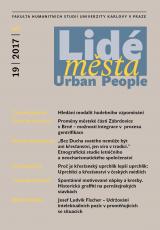Josef Ludvík Fischer – Udržování intelektuálních pozic v proměňujících se situacích
DOI:
https://doi.org/10.14712/12128112.3334Klíčová slova:
Josef Ludvík Fischer, Czech philosophy, Czech sociology, sociology - history of, methodology of scienceAbstrakt
This intellectual biography of Josef Ludvík Fischer, one of the profilin gfigures of Czech sociology in the second third of last century, is based on the reconstruction of his specific habitus as a member of the “constructive generation” of the so-called First Czechoslovak Republic. It shows the productivity of Fischer’s combination of sociological, philosophical, and literary theory approaches, and especially places emphasis on Fischer’s transition to the systemic-structural concept of sociological (Saint Simon and Auguste Comte, 1927) and noetic rationalism (Základy poznání/The Fundamentals of Knowledge, 1931), which preceded some of the methodological principles of the Prague Linguistic Circle. In these contexts, the biography also mentions Fischer’s early thoughts on the unified culture of Europe, as well as the related criticism of German National Socialism in the first third of the 1930s. The two-volume publication, Krize demokracie (The Crisis of Democracy), is highlighted as the second peak of Fischer’s work, which influenced the Czech leftist liberalism of the so-called “Barrandov Group”, and, with some of his concepts (qualitative democracy, economic parliament, cultural and political amalgamation, etc.), a young Václav Havel, as well.
Stahování
Publikováno
Jak citovat
Číslo
Sekce
Licence

Tato práce je licencována pod Mezinárodní licencí Creative Commons Attribution-NonCommercial-NoDerivatives 4.0.


